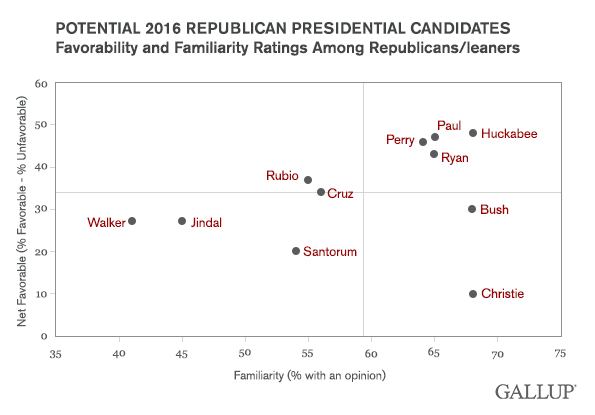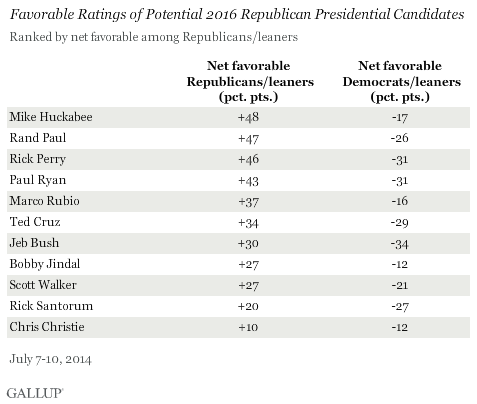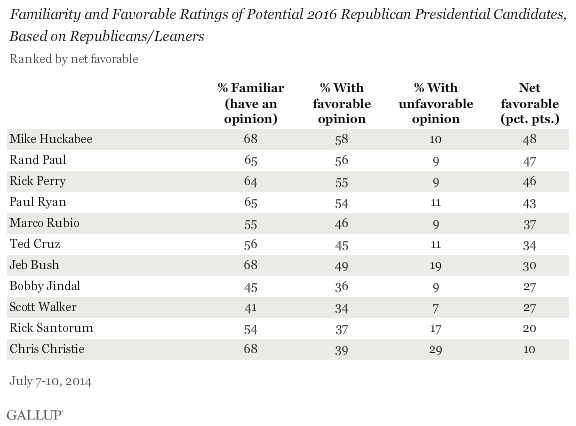PRINCETON, NJ -- Four potential GOP candidates for president in 2016 stand above seven others as the best known and best liked among Republicans at this early juncture in the nominating process. Former Arkansas Gov. Mike Huckabee, Kentucky Sen. Rand Paul, Wisconsin Rep. Paul Ryan, and Texas Gov. Rick Perry are all familiar to more than 60% of Republicans and Republican-leaning independents and have net favorable ratings of +40 or better. Huckabee has slightly higher familiarity and net favorability than the other 10 potential Republican candidates tested.

These findings are based on Gallup interviewing conducted July 7-10. The graph above displays Republicans' familiarity with each candidate on the horizontal axis and the net favorable rating on the vertical axis, which is based on the percentage of Republicans who have a favorable opinion minus those who have an unfavorable opinion. Those candidates in the upper-right quadrant have familiarity and net favorable ratings that are both above average. By contrast, those in the lower left quadrant have familiarity and net favorable ratings that are both below average.
Three of the four leading Republicans have previously competed in Republican presidential contests, and all four are highly visible on the national stage.
- Mike Huckabee ran for the GOP nomination in 2008, and he has been an active radio and television personality in the years since. At this point, he reigns as the single candidate with the best combination of familiarity and net favorability among Americans who identify with or lean toward the Republican Party nationwide.
- Paul Ryan was Mitt Romney's vice presidential nominee in 2012, and as chairman of the House Budget Committee, he is regarded as the GOP's resident expert on budget issues.
- Rand Paul has been active in nationwide politics since winning the U.S. Senate seat in Kentucky in 2010, taking strong libertarian-oriented positions on several issues, similar to his father Ron Paul, the former Texas representative, who had multiple presidential bids.
- Rick Perry unsuccessfully sought the 2012 GOP nomination. He has recently been in the news regarding the border crisis in his state of Texas, where many young immigrants from Mexico and Central America have crossed the border.
Two other possible GOP candidates are as familiar to Republicans as these four, but they both have below-average net favorable scores: Florida Gov. Jeb Bush and New Jersey Gov. Chris Christie. Despite Jeb Bush's staus as the son of a former president and the brother of another, Republicans' familiarity with him is no higher than any of the other possible candidates tested. Perhaps because some Republicans continue to have less than positive memories of his brother, Bush's unfavorable rating of 19% is the second highest of any of those tested. Chris Christie has the lowest net favorable (+10) of any candidate tested, with 39% holding a positive opinion and 29% a negative opinion.
Three other candidates have below-average familiarity, Texas Sen. Ted Cruz, Florida Sen. Marco Rubio, and former Pennsylvania Sen. Rick Santorum. Of these, Santorum, a very active candidate for the GOP nomination in 2012, has the lowest net favorable rating.
The final two candidates measured -- Louisiana Gov. Bobby Jindal and Wisconsin Gov. Scott Walker -- are familiar to less than half of Republicans and have net favorable scores that are slightly below average.
Complete data for each candidate is on page 2.
Democrats Like Jeb Bush Least and Christie and Jindal Most
All of the candidates measured have net negative favorable scores among Democrats and Democratic-leaning independents, as would be expected. Democrats are least positive about Jeb Bush, giving him a -34 net favorable rating, no doubt reflecting Democrats' associating him with the two Republicans who have served as president. Several of the other potential GOP candidates have net favorable scores among Democrats that are almost as low.

At the other end of the spectrum are Jindal and Christie, both of whom have the least negative net favorable scores among Democrats, at -12. Jindal is not as well-known as Christie among Democrats, with only a 38% familiarity score. Christie, on the other hand, has accomplished the remarkable feat of being as well-known among Democrats as he is among Republicans, with a 68% familiarity score among both. While Christie is the least well-liked among Republicans, he is least disliked among Democrats of any of the GOP candidates tested. Christie's favorability profile presents a challenge for him in securing the Republican nomination, given his lower relative popularity among the party base, but would potentially put him in a more advantageous position in a general election setting, given Democrats' lesser dislike for him than other GOP candidates.
Bottom Line
Less than 70% of Republicans and Republican leaners nationwide are familiar with any of the 11 potential GOP candidates tested, even though several actively campaigned for the Republican nomination in 2012, one was the 2012 vice presidential nominee, and others have been visible in the news in recent months. None of them has the same level of name recognition as Hillary Clinton or Joe Biden among all adults. This suggests that many Republicans have not yet turned their attention to the next presidential race.
The four candidates who have somewhat better images than others at this early stage -- Huckabee, Paul, Ryan, and Perry -- all have managed to keep themselves in the news over the past year and maintained a positive position in Republicans' eyes. Bush and Christie are as well-known nationally as these four, but they are not nearly as well-liked. Christie in particular has the distinction of being the least liked of the candidates measured among Republicans. Two candidates often mentioned as possible 2016 candidates -- Jindal and Walker -- have the most ground to gain because Republicans are less familiar with them than the other candidates measured.
Although the 2016 presidential election is more than two years away, active campaigning and preliminary debates will begin as early as the fall of 2015, meaning that next year is the real starting point for GOP candidates to intensify their quest to capture their party's nomination. While Hillary Clinton is regarded as a strong front-runner for the Democratic nomination should she choose to run, there is no clear leader at this point on the Republican side -- indicating that the race for the GOP nomination is essentially wide open.
Survey Methods
Results for this Gallup poll are based on telephone interviews conducted July 7-10, 2014, with a random sample of 1,013 adults, aged 18 and older, living in all 50 U.S. states and the District of Columbia.
For results based on the total sample of national adults, the margin of sampling error is ±4 percentage points at the 95% confidence level.
Interviews are conducted with respondents on landline telephones and cellular phones, with interviews conducted in Spanish for respondents who are primarily Spanish-speaking. Each sample of national adults includes a minimum quota of 50% cellphone respondents and 50% landline respondents, with additional minimum quotas by time zone within region. Landline and cellular telephone numbers are selected using random-digit-dial methods. Landline respondents are chosen at random within each household on the basis of which member had the most recent birthday.
Samples are weighted to correct for unequal selection probability, nonresponse, and double coverage of landline and cell users in the two sampling frames. They are also weighted to match the national demographics of gender, age, race, Hispanic ethnicity, education, region, population density, and phone status (cellphone only/landline only/both, and cellphone mostly). Demographic weighting targets are based on the most recent Current Population Survey figures for the aged 18 and older U.S. population. Phone status targets are based on the most recent National Health Interview Survey. Population density targets are based on the most recent U.S. census. All reported margins of sampling error include the computed design effects for weighting.
In addition to sampling error, question wording and practical difficulties in conducting surveys can introduce error or bias into the findings of public opinion polls.
View survey methodology, complete question responses, and trends.
For more details on Gallup's polling methodology, visit www.gallup.com.

